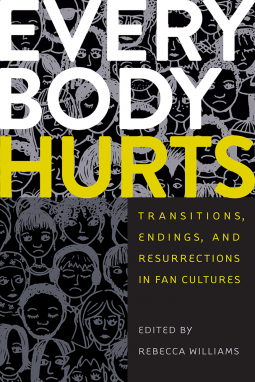
Everybody Hurts
Transitions, Endings, and Resurrections in Fan Cultures
by Rebecca Williams
This title was previously available on NetGalley and is now archived.
Send NetGalley books directly to your Kindle or Kindle app
1
To read on a Kindle or Kindle app, please add kindle@netgalley.com as an approved email address to receive files in your Amazon account. Click here for step-by-step instructions.
2
Also find your Kindle email address within your Amazon account, and enter it here.
Pub Date May 01 2018 | Archive Date May 01 2018
University of Iowa Press | Fandom & Culture
Talking about this book? Use #EverybodyHurts #NetGalley. More hashtag tips!
Description
Have you ever been a fan of a show that was canceled abruptly or that killed off a beloved character unexpectedly? Or perhaps it was rebooted after a long absence and now you’re worried it won’t be as good as the original? Anyone who has ever followed entertainment closely knows firsthand that such transitions can be jarring.
Indeed, for truly loyal fans, the loss can feel very real—even throwing their own identity into question. Examining how fans respond to and cope with transitions, endings, or resurrections in everything from band breakups (R.E.M.) to show cancellations (Hannibal) to closing down popular amusement park rides, this collection brings together an eclectic mix of scholars to analyze the various ways fans respond to change. Essays explore practices such as fan discussion and creating alternative fan fictions, as well as cases where fans abandon their objects of interest completely and move on to new ones. Shedding light on how fans react, both individually and as a community, the contributors also trace the commonalities and differences present in fandoms across a range of media, and they pay close attention to the ways fandom operates across paratexts and transmedia forms including films, comics, and television.
This fascinating approach promises to make an important contribution to the fields of fan, media, and cultural studies, and should appeal widely to students, scholars, and anyone else with a genuine interest in understanding why these transitions can have such a deep impact on fans’ lives.
A Note From the Publisher
Advance Praise
“Williams’s collection represents a timely intervention into a significant, emergent area of media cultural studies. Drawing expansively on the social psychology of fandom, its contributors offer an engaging array of studies that explore in-depth how fans experience feelings of loss, mourning, and change.”—Denise Bielby, University of California, Santa Barbara
“In its exploration of cancellations, closures, resurrections, and afterlives, this engaging collection makes an important contribution to our understanding of fans’ affective relationships to media objects, places, and experiences. The diverse chapters vividly demonstrate the value of studying moments of disruption and change for the field of fan studies research.”—Natasha Whiteman, University of Leicester
Available Editions
| EDITION | Paperback |
| ISBN | 9781609385637 |
| PRICE | $80.00 (USD) |
| PAGES | 260 |
Links
Featured Reviews
 Reviewer 153322
Reviewer 153322
The anguished blog and forum postings of fandom are rich material in this set of essays analyzing the ways in which people react to the endings of, changes to and disappearance of things they love--aging out of Backstreet Boys fandom, discovering a celebrity you love is a creep (especially useful these days!), people demanding a TV show be canceled because they don't like the death of a character, fanfiction revisions of plots, protests when Disney World shut down a beloved but aged ride. The scholarship is serious, and links these popular culture people and events to established processes like grieving and political activism.
 Kimberly O, Educator
Kimberly O, Educator
Rebecca Williams and her chapter contributors have written a fascinating look at what happens when a fandom experiences an end - whether it is through a break up, a cancellation, a closing, the removal of a physical site, or even viciousness within a fandom that causes a break up with the object of affection. I thoroughly enjoyed this well researched and well reasoned examination of an aspect of fandom that has not received a lot of academic attention.
Everybody Hurts is a good introduction to this niche of fan studies. Each chapter could have been expanded into an interesting book of its own. I hope that the chapter contributors are able to continue their research and hopefully write more books on this subject.
 Sandra K, Reviewer
Sandra K, Reviewer
A fascinating look into the relationships fans hold with the objects of their affections, and how the ending of those relationships can lead to real psychological and emotional upheaval. The scholarly articles contained here cover a wide variety of fan-objects. While many people think of TV shows, musical groups, and sports teams when they think of fans, this book also looks at fan relationships to things like amusement park rides. From bands breaking up, the end of a TV show, an amusement ride closing, or a popular celebrity faced with criminal charges, this book explores the ways fans both express grief and employ psychological strategies to protect themselves from it. As both a scholar and a fan, Everybody Hurts shed light on fan behavior that has always stumped me and explained what has sometimes seemed like unreasonable attachment in my own life.
 Janice B, Reviewer
Janice B, Reviewer
What a fascinating subject for a book! Each of the chapters covers a topic that could easily be expanded to book length. The social psychology of fandom is a diverse and complex area of study, especially in our times of increasing interpersonal isolation. I have certainly felt the strong effects of a favourite show being cancelled, a band breaking up , my home team losing in the playoffs etc. The book therefore has a strong personal interest for most of us, I’m sure. Scholarly yet not “stuffy”, this book is recommended for sure.
My thanks to NetGalley for providing me with an arc in exchange for my honest review.
 Reviewer 446033
Reviewer 446033
#EverybodyHurts #NetGalley
An excellent tribute book to R.E.M. Rebecca uses a particular approach to explore the fan's belonging status to the group by the influence of different factors such band breakups, to show cancellations, films, comics, television, and other social influencers. I recommend this book for Social studies classes.
 Hillary J, Librarian
Hillary J, Librarian
Given how closely we identify with our media and how this has been going on since at least the 80's, this kind of book is overdue! It may also be a good resources for school officials and counselors to understand that "no, it's not just a tv show" to some people, and also to draw a line for when obsession becomes addiction, because it can happen and affect the human psyche. We love our media, it becomes and extension of us, and now with the prevalence of the Metoo movement taking down so many bad men, finally, a lot of us are dealing with separation and even revulsion with shows we formerly loved, and that deserves to be taken seriously.












